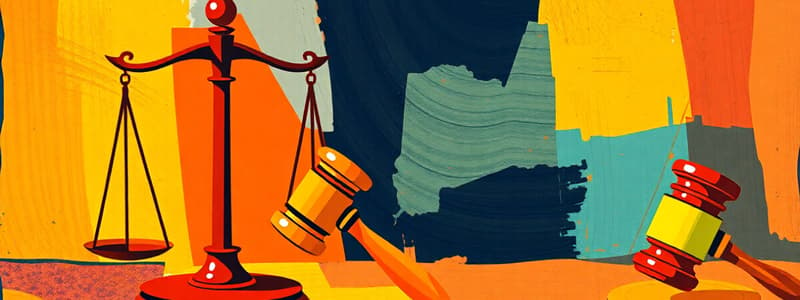Podcast
Questions and Answers
Which of these is NOT a major area of business law?
Which of these is NOT a major area of business law?
- Corporate Governance
- Intellectual Property Law
- Contract Law
- Employment Law (correct)
What is the primary goal of antitrust laws?
What is the primary goal of antitrust laws?
- Regulating the stock market
- Ensuring fair labor practices
- Protecting consumer privacy
- Promoting competition and preventing monopolies (correct)
What is a potential consequence of violating antitrust laws?
What is a potential consequence of violating antitrust laws?
- Imprisonment (correct)
- Loss of tax benefits
- Mandatory community service
- Revocation of business licenses
Which legal area addresses issues like deceptive advertising and unfair business practices?
Which legal area addresses issues like deceptive advertising and unfair business practices?
What is the main objective of property law?
What is the main objective of property law?
What is a sole proprietorship?
What is a sole proprietorship?
Which business entity provides limited liability protection to its owners?
Which business entity provides limited liability protection to its owners?
What is the essential element of a valid contract that involves something of value exchanged?
What is the essential element of a valid contract that involves something of value exchanged?
Which type of law aims to balance creators' rights with public access?
Which type of law aims to balance creators' rights with public access?
What happens when a party breaches a contract?
What happens when a party breaches a contract?
Which of the following covers minimum wage and workplace safety standards?
Which of the following covers minimum wage and workplace safety standards?
Which of the following best defines a partnership?
Which of the following best defines a partnership?
Which legal protection is specifically for inventions?
Which legal protection is specifically for inventions?
Flashcards
Consumer Protection Law
Consumer Protection Law
Laws protecting consumers from unfair business practices like deceptive advertising and unsafe products.
Antitrust Law
Antitrust Law
Laws preventing monopolies and promoting competition in the marketplace.
Property Law
Property Law
Laws governing ownership, use, and transfer of real estate and personal property.
Criminal Law
Criminal Law
Signup and view all the flashcards
Corporate Governance
Corporate Governance
Signup and view all the flashcards
Sole Proprietorship
Sole Proprietorship
Signup and view all the flashcards
Partnership
Partnership
Signup and view all the flashcards
Limited Liability Company (LLC)
Limited Liability Company (LLC)
Signup and view all the flashcards
Corporation
Corporation
Signup and view all the flashcards
Contracts
Contracts
Signup and view all the flashcards
Breach of Contract
Breach of Contract
Signup and view all the flashcards
Intellectual Property (IP)
Intellectual Property (IP)
Signup and view all the flashcards
Employment Law
Employment Law
Signup and view all the flashcards
Study Notes
Introduction to Business Law
- Business law encompasses legal rules and regulations governing business operations.
- It provides a framework for conducting business, resolving disputes, and maintaining market order.
- Business laws vary by jurisdiction, incorporating federal, state, and local regulations.
- These laws define acceptable business conduct, establishing rights and responsibilities.
Types of Business Entities
- Sole Proprietorship: A single-owner business with no legal separation from the owner.
- Partnership: A business with two or more owners, sharing profits and liabilities; formal agreements are crucial.
- Limited Liability Company (LLC): A hybrid structure combining partnership and corporation aspects, offering limited liability protection. It often features pass-through taxation, similar to a partnership.
- Corporation: A separate legal entity from its owners (shareholders), offering limited liability but more complex legal requirements and taxation.
Contract Law
- Contracts are legally enforceable agreements between parties.
- Essential elements for a valid contract include offer, acceptance, consideration, capacity, and legality.
- Breach of contract occurs when a party fails to meet contractual obligations; legal recourse may be available.
- Contract formation varies legally by jurisdiction.
Intellectual Property Law
- Intellectual property (IP) encompasses creations of the mind, like inventions, literary works, and commercial symbols.
- Patents protect inventions, trademarks protect brand names/logos, and copyrights protect original works.
- IP law balances creator rights with public access to knowledge and innovation.
Employment Law
- Employment law regulates employer-employee relationships, covering hiring, wages, conditions, and termination.
- Federal and state laws often mandate minimum wage, overtime pay, and workplace safety.
- Employment discrimination is illegal in many jurisdictions.
Consumer Protection Law
- Consumer protection laws safeguard consumer rights and interests.
- These laws address deceptive advertising, unfair practices, and product safety.
- Laws ensure fair dealings between businesses and consumers.
Antitrust Law
- Antitrust laws promote competition and prevent monopolies.
- These laws address anti-competitive practices like price fixing, bid-rigging, and market allocation.
- Violating antitrust laws can result in substantial penalties, such as fines or imprisonment.
Property Law
- Property law governs real and personal property ownership, use, and transfer.
- It covers land rights, landlord-tenant relationships, and asset transfer.
- Property law principles differ significantly among jurisdictions.
Criminal Law (as it relates to Business)
- Business operations face criminal charges for fraud, embezzlement, and other illegal activities.
- Penalties for criminal acts can be severe, including fines, imprisonment, and reputational damage.
Corporate Governance
- Corporate governance defines a company's structure, decision-making, accountability, and compliance.
- It considers shareholder rights, board responsibilities, and ethical conduct.
- Effective corporate governance reduces risk and increases transparency.
Tort Law (In the context of business)
- Business torts involve negligence or intentional harm in business relationships.
- Relevant torts include product liability, negligence, and intentional conduct.
- Victims often seek compensation for harm or loss.
Studying That Suits You
Use AI to generate personalized quizzes and flashcards to suit your learning preferences.




